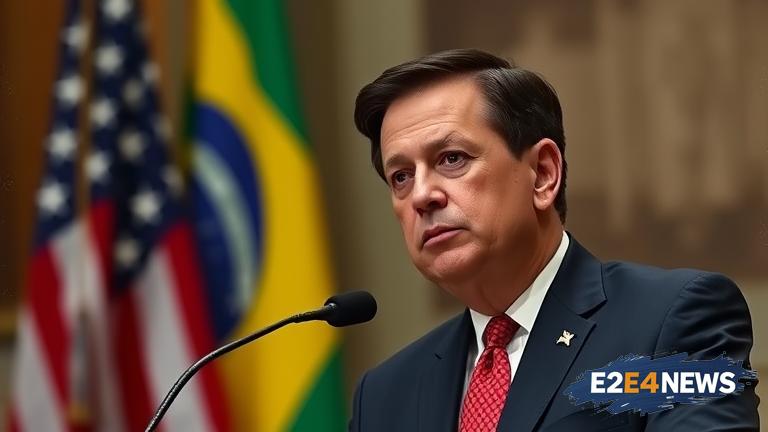The United States has imposed sanctions on a Brazilian Supreme Court justice who is overseeing a high-profile case against former President Jair Bolsonaro. The move has been met with widespread criticism and has sparked diplomatic tensions between the two nations. The sanctions, which were announced by the US Department of the Treasury, target the justice for alleged human rights abuses and corruption. The Brazilian government has condemned the sanctions, calling them an unacceptable interference in the country’s internal affairs. The case against Bolsonaro, who was defeated in the 2022 presidential election, alleges that he incited violence and spread misinformation during his time in office. The former president has denied all wrongdoing and has claimed that the charges against him are politically motivated. The US sanctions have been seen as a significant escalation in the diplomatic row between the two nations, with many in Brazil viewing them as an attempt to exert pressure on the country’s judiciary. The Brazilian Supreme Court has been at the center of the case against Bolsonaro, with the justice who has been sanctioned playing a key role in the proceedings. The court has been praised for its independence and impartiality, and many have expressed concern that the US sanctions could undermine its ability to carry out its duties. The US has a long history of imposing sanctions on foreign officials and entities, but the move against the Brazilian Supreme Court justice is seen as unusual. The sanctions have been imposed under the Global Magnitsky Human Rights Accountability Act, which allows the US to target individuals and entities for human rights abuses and corruption. The Brazilian government has vowed to take action in response to the sanctions, with many calling for the country to impose its own sanctions on US officials. The diplomatic row between the two nations is likely to have significant implications for their bilateral relations, with many areas of cooperation potentially being affected. The US and Brazil have a long history of cooperation on trade, security, and other issues, but the sanctions have created a significant rift between the two nations. The case against Bolsonaro is seen as a major test of the Brazilian judiciary’s independence and ability to hold those in power accountable. The former president has a significant following in Brazil, and many of his supporters have taken to the streets to protest the charges against him. The US sanctions have been seen as a significant escalation in the diplomatic row between the two nations, with many in Brazil viewing them as an attempt to exert pressure on the country’s judiciary. The Brazilian government has vowed to defend its sovereignty and independence, and has called on the US to respect its internal affairs. The sanctions have also sparked a wider debate about the role of the US in Latin America, with many questioning the country’s motives and actions in the region. The US has a long history of intervention in Latin America, and many have expressed concern that the sanctions against the Brazilian Supreme Court justice are part of a larger pattern of behavior. The diplomatic row between the two nations is likely to continue, with many areas of cooperation potentially being affected. The case against Bolsonaro is seen as a major test of the Brazilian judiciary’s independence and ability to hold those in power accountable, and the US sanctions have created a significant rift between the two nations.





